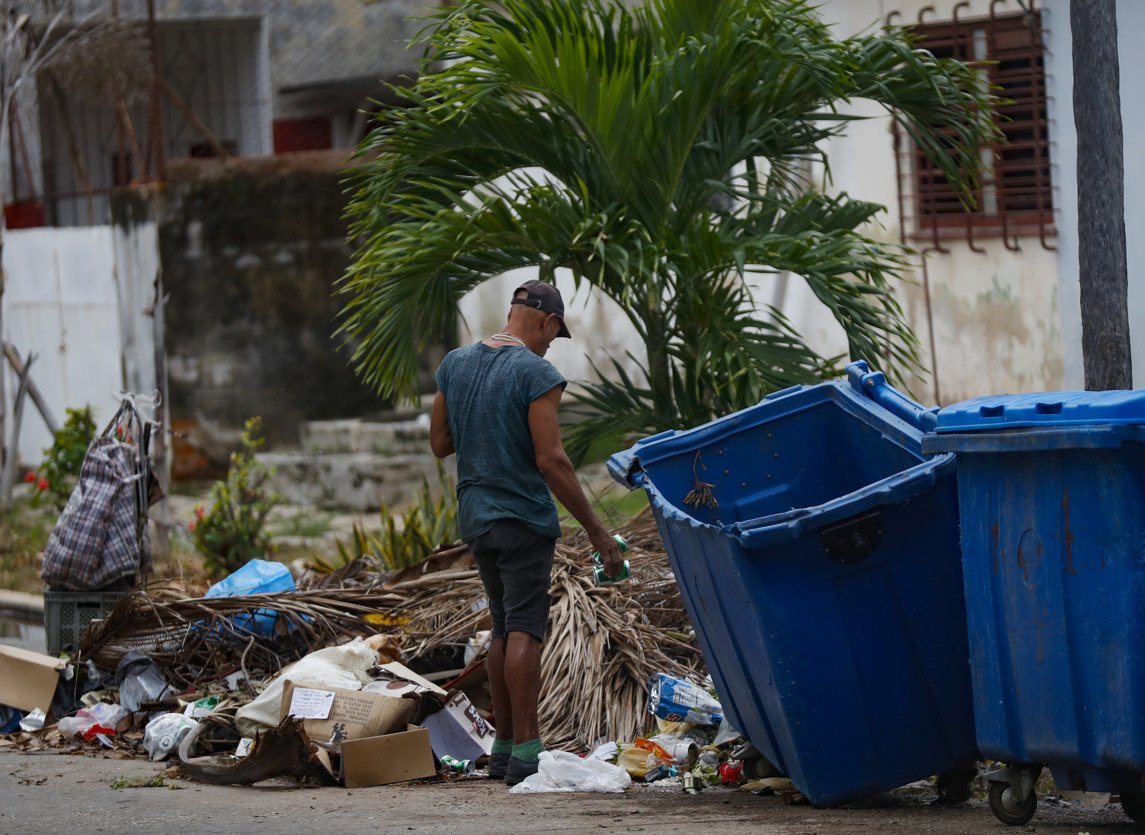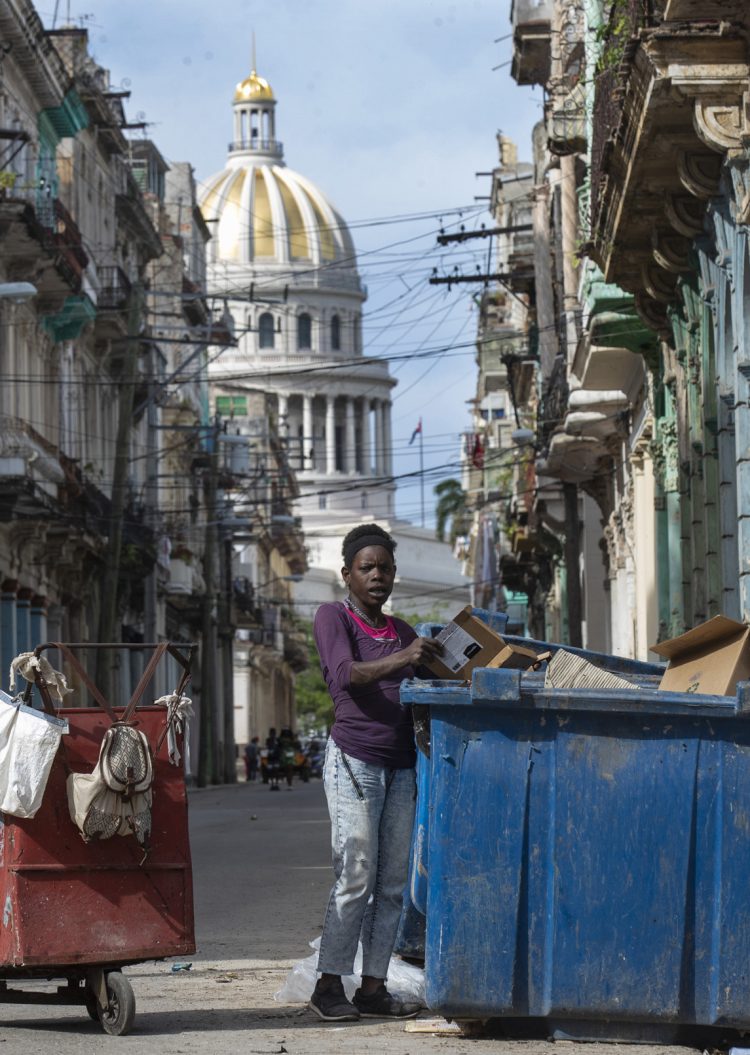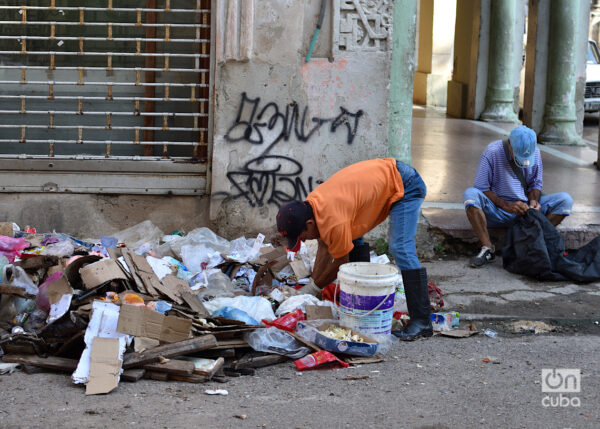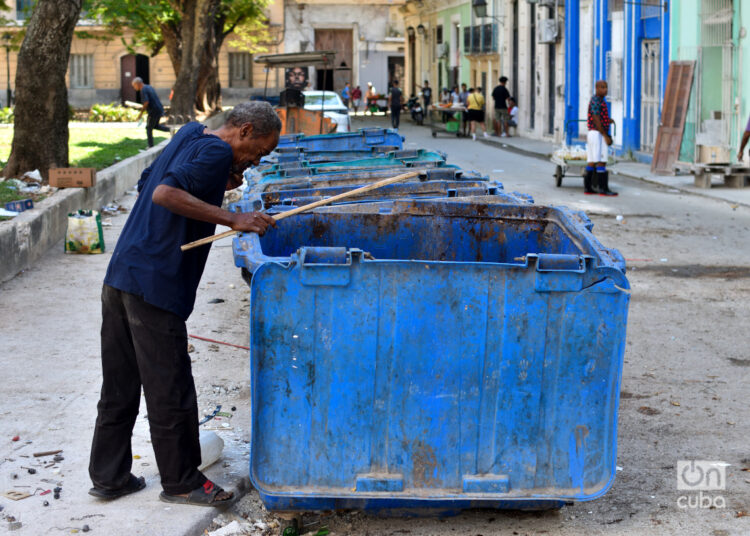Various signs foreshadowed the latest ministerial nonsense, which merely represents a strident expression — somewhat unexpected by its spokesperson — of the usual way official discourse constructs and conveys the narrative about Cuban reality. This is nothing new: it has precedents in the authorities’ habitual refusal to use the word poverty, as well as in the term “Special Period in Peacetime” to designate the crisis of the 1990s, and other variants are introduced in the post-COVID-19 era.
It is a narrative that evades the most explanatory terms to refer to the crisis — the polycrisis — we are experiencing, and prefers to call it “the complex situation”: economic, energy, supply, meteorological, health, epidemiological, food production, and so on.
This way of naming things draws a sectorized map that undervalues the articulations, synchronizations, and mutual reinforcement of individual “complex situations.” This prevents politics from grasping the exponential impact of its concatenation and attenuates its general, structural, and systemic nature.
It is unacceptable that when analyzing the causes of the “complex situation,” the U.S. blockade is foregrounded, and then “our own mistakes” are mentioned, without specifying exactly what they are, or accounting for them, or assuming responsibility at the appropriate level.
It is also true that the government’s program for managing “the complex situation” is defined as correcting distortions and profound structural deviations and reactivating the economy, without specifically identifying these distortions or demonstrating the comprehensive strategy for structural change and model that a polycrisis demands.
That, when addressing criticisms, demands and protests arising from the precariousness of daily life that the “complex situation” has generated for the entire population — especially for at least 45% of those living in poverty (according to my own calculations) — the government chooses to frame them, for the most part, as illegitimate, mercenary or violent; to demoralize or repress such attitudes, without opening the option for dialogue between diverse and knowledgeable citizens who want to contribute to the peaceful and collaborative foundation of a better country.
This way of constructing reality with words and data that diminish problems has its counterpart in the field of social issues. La Calle column has already addressed the issue with concern, pointing out, for example, that the preference for multidimensional poverty as an approach to measuring progress toward the 2030 Agenda goals — and considering that personal and family income is not decisive for meeting essential needs — dramatically underestimates the true proportion of disadvantaged groups and the magnitude of their daily plight.
Likewise, about an article in the Granma newspaper last March, this column showed that, after the fair and necessary declaration that begging is a social phenomenon linked to inequality and poverty, the article focuses on showing its links with practices that violate the law, constitute crimes and are therefore punishable.
The article’s author adds that families are required by law to meet needs for sustenance, housing, health, recreation, and personal and emotional care, and that, when this is not possible, the State — through the Social Assistance system — is responsible for their protection.

New episodes of problems from the past
The Provincial Department of Labor and Social Security in Santiago de Cuba told the Sierra Maestra newspaper that family failure to comply with the provisions of the new Family Code — which clearly defines responsibilities toward vulnerable members — is one of the main causes identified for the increase in homeless people in the city.
In April of this year, the Ministry of Labor and Social Security announced the approval of new regulations for vagrants. The purpose is to modernize community social services that contribute to the rehabilitation and social reintegration of these individuals, through social protection centers and multidisciplinary teams chaired by the mayor and comprised of social workers, health representatives, and the National Revolutionary Police. In cases involving minors, the Ministry of Education and the Ministry of the Interior are also involved.
The teams evaluate each case, seeking personalized and sustainable solutions, such as family reintegration, relocation to the provinces of origin, placement in institutions, or access to subsidies and temporary housing. Medical care and social and psychological support are also included to restore a sense of belonging and self-esteem.

Making begging visible and addressing it as a situation of extreme deprivation, and establishing services for its protection, is a step forward in terms of recognizing the critical social situation in the country and policies for rights and social inclusion.
However, the law introduces a very partial definition of people living on the streets: “wandering behavior is a multi-causal human behavioral disorder that constitutes a lifestyle characterized by instability and insecurity in the home, a lack of self-care and economic autonomy, family care or support, as well as a favorable life plan, or a combination of these factors. It is usually evidenced through the violation of the norms of coexistence and social discipline.”
The definition omits reference to the poverty of those suffering from this condition and its structural causes, emphasizing individual behavioral factors and thus paving the way for re-victimizing and controlling approaches.
An official of the Ministry of Labor and Social Security (MTSS) explained to Granma that the law provides for action against those who, without an associated intellectual or mental disability, refuse prophylactic work, and establishes the protocol for the detection, information and transfer of people with vagrant behavior, which incorporates a preventive component and public participation and control.
Human behavioral disorders, families that fail to fulfill their obligations, unscrupulous individuals who take advantage of others’ shortcomings to profit, and beggars who don’t have to be beggars are the causes/culprits of begging.
These examples suffice to show how political discourse, which ignores the reality and social causes of critical situations, is widespread and embedded in the most diverse areas of the country’s leadership and ends up inspiring public policies that fall far short of the severity of the problems, shifting a significant portion of the responsibility for possible solutions to families and individuals who are generally in no position to take responsibility for them. As a result, its potential for change is weakened, while its re-victimizing effect and the reproduction of the problems it seeks to overcome expand. This is further evidence of the breakdown of the social pact based on equity and inclusion.

What’s astonishing to me is that it was precisely the Minister of Labor and Social Security who twisted that narrative to reach typically neoliberal extremes: denying the existence of poverty, branding beggars as fake, and urging not to exercise individual solidarity with them.
I’m amazed because that ministry has convened a technical advisory team made up of academicians with extensive experience in researching inequalities, poverty, exclusion, and labor issues, who have conveyed their critical vision to the institution.
I’m amazed because the MTSS has officials and specialists — many from social work backgrounds — who are familiar with the harsh realities, sensitive to them, and capable of working collaboratively with academia in the formulation of its social policies.
The MTSS created its Social and Labor Observatory, and with it, it produces and studies information from the grassroots. This would be a good case study of executive mindsets and their influence on public policy.
I would like to draw some lessons from this affair.
The first is that the Minister of Labor’s statement is merely an emergency one, emerging from the framework of biased interpretations of reality embedded in the political and government sphere. Her resignation, dismissal, or “release” does not resolve the problem.
The issue, beyond her, is much more serious than what they consider her mistake: “superficially addressing issues that are central to political and government management.” It goes beyond any measure of superficiality.
These statements were part of her speech at the Committees for Attention to Local Bodies of People’s Power and for Attention to Youth, Children and Equal Rights for Women of the National Assembly of People’s Power. The committee members listened and applauded without expressing a dissenting opinion, without discussing an approach so far removed from what the Assembly’s mission should be, without leaving the room in protest.
But people on the streets and online were attentive and didn’t let it go. The denial of reality acted as a catalyst. The harshest critical judgments were expressed without delay, and her dismissal was demanded — a demand clearly constructed from within, without the need for outside impulses, and to which the most diverse ideological positions adhered via social media. These demands can be attributed to considerable force for the presidency to distance itself from the minister’s point of view. Various officials reiterated the humanist vocation of the institution and its policies, and their commitment to “leaving no one unprotected.”
At the same time, the prime minister announced that, starting in September, a pension increase will be implemented for retirees who currently receive up to 4,000 pesos per month. This is intended to alleviate the “complex” economic situation of this sector, surely already in place. This situation also involves pressure from citizens who have shown particular concern for the dignity of the elderly. Warning: this increase is a slight improvement, but 4,000 CUP is an amount below the coverage of basic needs.
Disavowal, dismissal, rhetorical ratification of the commitment to the most vulnerable, and pension increases are not enough. Showing a true shift away from these positions requires, for the moment, taking two paths: discussing the silence of the deputies, the composition of the Assembly, and its real possibilities for critical action and counterbalancing high-ranking officials and powerful institutions. It’s not that we haven’t known for some time that the Assembly doesn’t work; rather, this incident screamed it out in a context saturated with tensions and at the limits of what is daily bearable for the majority.
The second path is to analyze the inclusion policies underway, from the perspective of their real capacity to articulate with structural and systemic changes and to interrupt and reverse the reproduction of the problems they address (poverty, vulnerability, violence, racialized and gender equity gaps, among others), the respective economic linkages that provide them with the necessary resources and sustainability, and the concrete mechanisms for implementation, participation and transparency.
This will not be possible without an active and supportive citizenry, capable of embracing “real reality” (yes, with intentional redundancy) without fear, especially in the face of social policies. A citizenry that isn’t content with vertical consultations whose fate is unknown, but that does encourage and value all forms of solidarity and charity that wish to contribute. That door has just opened, and the most important thing is the message it leaves both for the country’s leadership and for ourselves: social justice summons, and it is a meeting point for those who think differently.






